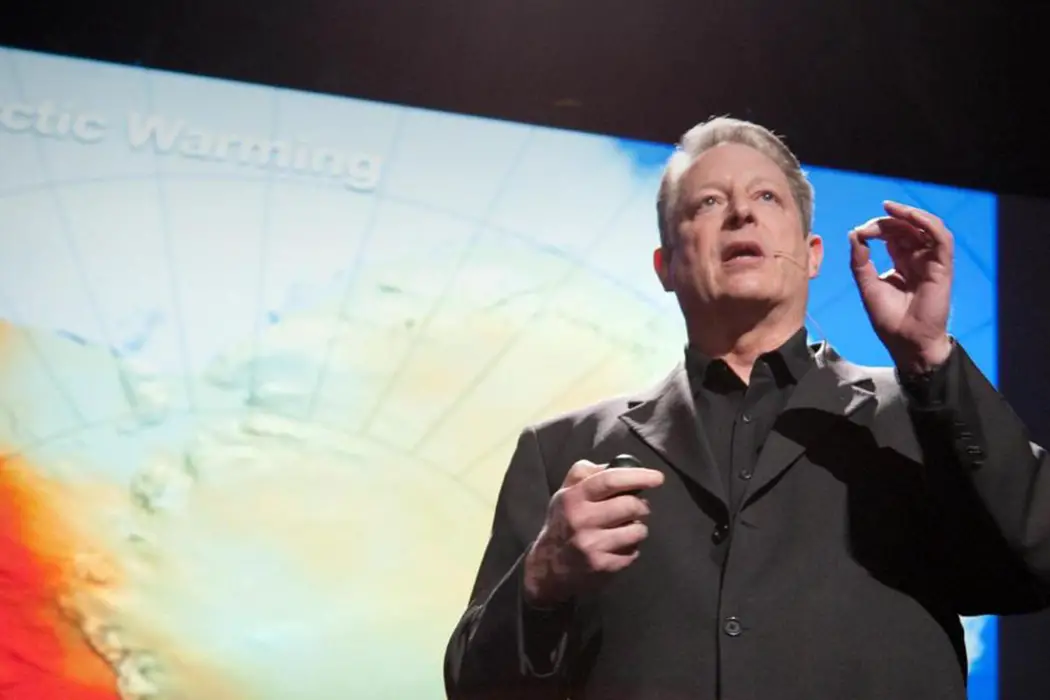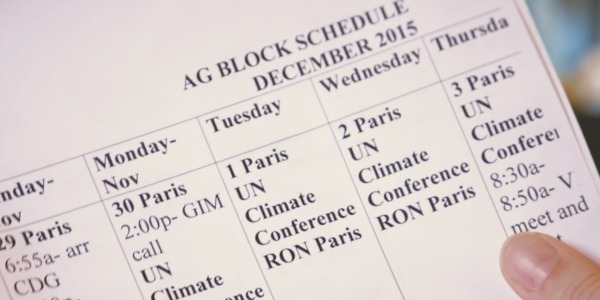AN INCONVENIENT SEQUEL: An Inconvenient Distribution Strategy, A Powerful Plea

Alex Arabian is a freelance film journalist and filmmaker. His…
Al Gore is, in every sense of the term, a renaissance man. He was one of the revolutionaries responsible for bringing the internet into being by nurturing its development in an economic and legislative sense, served 16 years in the United States Congress, was elected the 45th vice president of the United States, and was even elected by the people of America and the American electoral college to be the 43rd president of the United States in 2000.
But, unfortunately, the GOP committed widespread, organized voter fraud and pulled the infamous Florida Election Recount after George W. Bush lost that state, of which his brother, Jeb was governor of at the time, after which Bush was handed back the victory. This was ruled unconstitutional by the United States federal government, but no “constitutionally valid recount could be successfully completed by the December 12, 2000 deadline.”
Yet, however different the world’s future would have been for the better if Gore didn’t “lose” the 2000 presidential election, it was, in many ways, a blessing in disguise. Gore, a lifelong environmentalist, focused his time and resources on making An Inconvenient Truth, which is generally regarded as the most influential piece of substantiated documentation of global warming that spread the issue to the masses of the world. It even won him a Nobel Peace Prize. Gore has done more good for our Earth than most people in his similar, fortunate financial situation and position of power.
An Inconvenient Sequel: Truth To Power, is a fine follow-up and a pressing plea for preservationism and selflessness. It is timely, particularly since the current United States administration is attempting to discredit the entire concept of global warming and dismantle all policies associated with it (Trump’s abandonment from the Paris Accord) so it can focus on its affluent White House inhabitants’ business interests. So much for draining the swamp, huh?
Unfortunately, An Inconvenient Sequel ironically had quite a problematic distribution strategy. For a film promoting conservationism and preservation of resources and diminishing pollution, An Inconvenient Sequel had such a limited release in the United States, that most people who wanted to see it had to drive long distances in order to do so. I live in San Francisco, and I couldn’t even find a theater that was playing it near me during its seemingly nonexistent theatrical run.
As such, that means that many more miles spent driving cars that still run on oil that emit extensive amounts of pollutants such as carbon monoxide, greenhouse gases such as carbon dioxide, methane, and nitrous oxide, and other harmful air pollutants that damage our ozone layer. Suffice it to say, it would have been far wiser to have distributed An Inconvenient Sequel digitally. It not only would’ve made the studios involved more money, from a financial standpoint, but it also would have reached a far larger audience, and this film really needed to. Most of of all, it would have been the more environmentally responsible distribution strategy. As such and unfortunately, An Inconvenient Sequel went under the radar.
Still, Gore (despite a little too much time in front of the camera), crafts another articulate, scientifically sound, rational, and timely documentary about global warming. This time around, as it should be, the film has a more foreboding and desperate tone. Desperate times call for desperate measures, and, as a result, there are some narrative missteps through over-substantiation and a splintered focus. However, An Inconvenient Sequel rights its ship in time to be effective. So, let us unpack some of the important points that Gore discusses and the way in which he and filmmakers Bonni Cohen and Jon Shenk deliver his messages.
Silencing The Haters With Truth
From the very beginning of An Inconvenient Sequel, Cohen and Shenk immediately confront the conservative extremists who refuse to believe in global climate change; the ones who compare uncovering the truth of humankind’s destruction of the planet to exposing the atrocities of Nazi Germany as if we shouldn’t be talking about the issue because it unsettles us; the people of power who, deep down, believe global climate change exists, but don’t care because environmental preservation isn’t as financially accretive to them; the ones that think global climate change is a hoax created by the liberals to defeat the conservatives, still, even as catastrophic global natural disasters have grown exponentially worse over the past 10 years. Gore has been consistently silenced by the Senate. Not surprisingly, Donald Trump has even tried to convince the Nobel Foundation to strip Gore of his Nobel Peace Prize to try and change history and hide the truth.

Cohen and Shenk prepare the audience for the main focus event of An Inconvenient Sequel, the United Nations Climate Conference in Paris on November 30, 2015. Gore shows an instant vulnerability to relate to the audience. He admits to having almost given up when faced with increasing criticism and financially funded global efforts to thwart the spread of global climate change awareness. Yet, the world is confronted head-on with facts. Fourteen out of the last fifteen years on earth have been the hottest years ever recorded, with more frequent and hotter days each year. These are not alternative facts, unless you consider a thermometer obsolete.
The audience is taken from melting glacier to melting glacier to the places impacted by the subsequent rising sea levels. The visuals provided are astounding, haunting, beautiful, and impactful. Yet, Gore falls victim to talking too much at length about the issues such as melting glaciers instead of offering a concrete solution. To his defense, it is virtually impossible to develop a concrete solution when our world is so ideologically divided on this issue. For example, and rightfully so, America has been vilified as an industrial powerhouse of Western civilization for 150 years, and as a result, countries that are still developing their infrastructure such as India feel as though they have their own right to make their own carbon footprint.
Such is the problem with a country like America, the most imperialistic nation in the history of the world; we’ve taken advantage of so many other nations, resources, and groups of people, that when we start trying to spread global awareness about an issue that we’ve largely contributed to, it’s easy to imagine why governments are hesitant to believe the magnitude of severity of global climate change and not question whether or not we have an ulterior, financial motive.
The true power in An Inconvenient Sequel lies not in the statistical numbers for the average viewer, but most likely is most effective when it shows devastating footage of the increasing natural disasters that have occurred over the last 10 years.
Preparation Over Propagation
An Inconvenient Sequel sometimes falls short in focusing too heavily on Gore’s preparation for all of his presentations, distracting from his message; twenty minutes of superfluous clips of Gore going through slides and watching online videos on his free time could have been eliminated from the film. The preparation is readily apparent through the clarity of the presentations that the viewer frequently attends throughout the film. Gore’s message is clear: we are f*cked unless we don’t take immediate action.
In doing so, he walks too close to the line between coming off as intentionally intimidating and trying to spread his message with sobering facts in a blunt way. There is one message that hits home for Americans, regardless of political affiliation, however.
Big money, created by years of corporate greed, Wall Street corruption, and loopholes defying the logic of anti-trust laws, have invaded American democracy. Unfortunately, money is equated to power, at least that still remains the predominant assumption. As such, we have been plagued by a plethora of misinformation and been hit with a new era of politicians, one who have no sense of moral obligation to the people of their country or their world; ones that are primarily motivated by money and easily drunk off of the power it can make one feel. Big money takes advantage of this vulnerability. American Petroleum and Exxon Mobil are actively seeking to suppress the global market for renewable energy, committing consumer and securities fraud without corporate consequences.

Has Gore accepted legal donations before in his politician days? Absolutely. As Gore likes to say, he’s a “recovering politician.” However, contributions were never accepted for any kind of sinister agenda that put humanity at stake.
The United States has now become dinosaurs in the race to preserve the planet. Everything in An Inconvenient Sequel builds to the U.N. Conference in Paris, a giant opportunity for the United States to make up for lost time and right its willful denials. An example of such denials: Gore and a group of NASA scientists invented the Dscovr Satellite, approved by Congress, which would act as a warning to Earth for pending weather catastrophes by using devices such as an instrument that could detect solar storms that effect the electric utility, grids, and pipelines that our world runs on. The launch was cancelled after Bush and Dick Cheney were “elected.”
What did they do to please the businesses who had interests in the Dscovr Satellite? They stripped it of all of its climate change warming devices, and placed only this one device on the satellite that said organizations wanted to be put into orbit for financial gain. Eventually, the whole project was shelved altogether.
Unfortunately, similarly in a sense, for some reason Cohen and Shenk do the same with the handling of the U.N. Conference. They completely forget about it, hurdling over tangent after tangent, until the third act. As such, it’s hard to keep the audience fixated until then, as the conference is referenced in the beginning, but there isn’t an adequate enough suspense leading up to the event, which should have been covered for most of the film. It is during this act that solutions become more seemingly reachable for humanity.
An Incredible Third Act
It might have been more effective for Cohen, Shenk, and Gore to focus on the organized coalition to implement global climate change, rather than rehashing his life’s successes, mishaps, frustrations, and going over mundane planning sessions that take away from An Inconvenient Sequel’s narrative. They do a wonderful job of calling out the United States of America for its negligence in willfully ignoring the greatest existential crisis to humanity since we evolved to have the ability walk upright.
An Inconvenient Sequel takes well over 30 minutes to find its footing. There is far too much of Gore giving presentation after redundant presentation at his various Climate Leadership Training conferences, instead of focusing on the end game. Finally, at around the 40-minute mark, the audience gets the main point of the documentary: our global leaders and its people need to unite to speed up the transition from converting energy sources from fossil fuels to renewable energy sources such as windmills and solar energy. The problem? There is an ideological divide between rich and poor countries on this matter.
After this problem is finally addressed, the potential solutions begin to be discussed, but, more powerfully, the film finds its voice in the third act. It is devastatingly effective as soon as Cohen and Shenk channel two of Gore’s more impassioned speeches with a singular focus, juxtaposed over shocking footage of natural disasters. This sets the tone for the coverage of the infamous 2015 Paris terrorist attacks carried out by ISIS that killed 130 people and injured 413 on November 13. Though the politics behind this event are unrelated to the narrative, it provides an even more dire stage for where humanity’s grievances need to be focused on, saving our world, not killing each other and disregarding humankind’s future.

This event placed an added pressure on the world. Two weeks later, American President Barrack Obama and 194 other nations signed the Paris Accord; the solution. Tragedy can prompt people to come together for a common good, and focus on a larger moral issue that directly effects everyone’s survival, not just their own nation’s inward, selfish interests. It adds weight to some of Gore’s personal rehashing and struggle, and the viewer begins to see his struggle as synonymous with our struggle as a species.
Case And Point: An Inconvenient Sequel
The world needs a reminder of our dire existential threat that is global warming or global climate change, and, in that sense, An Inconvenient Sequel does its job of going over the basics of the causes and effects of said threat again. Yet, a lot of this revisiting seems superfluous unless you’ve been living under a rock for the last twenty years. It drags, and intermittently offers half-baked plans for our future as much as it can in this shattered, divided world. The audience must give Gore immense credit for his passion, tireless work, and influence on humankind’s outlook on the world.
After all of that collective work the world put in to enter the Paris Agreement, for 196 nations to come together and agree on one issue, and then have the most economically powerful nation in the world, the United States, back out of the accord in 2017 after a catastrophic political mishap shrouded in corruption, conspiracy, and ulterior financial motives, proves how relevant An Inconvenient Sequel’s message still is. Donald Trump doesn’t believe in global climate change, and that is one of many immensely dangerous facets of his mentally and intellectually inhibited brain.
Though An Inconvenient Sequel: Truth To Power stalls and gets in the way of itself due to narrative clashes and too many questions asked instead of answered, Cohen and Shenk do their best to cover the ground that has been missed since An Inconvenient Truth, while trying to satisfy Gore‘s personal plight and do his story justice. Regardless of some of the arguments that Cohen, Shenk, and Gore can’t seem to zero in on, An Inconvenient Sequel is a documentary that everyone needs to see, and hopefully now that it is accessible in homes everywhere across the world that have cable, it can get the exposure it desperately needs.
Do you believe in global climate change? Good. Want to make a difference? Visit www.climaterealityproject.org to see what you can do. Did An Inconvenient Sequel: Truth to Power strike a chord with you? Did it offer any new and/or sobering or difficult realizations that may have slipped your mind since its predecessor was released in 2006?
An Inconvenient Sequel: Truth to Power was released in the United States on July 28, 2017. It is available for viewing on most major digital streaming services as of October 6, 2017. For all international release dates, see here.
https://www.youtube.com/watch?v=huX1bmfdkyA%20Does content like this matter to you?
Become a Member and support film journalism. Unlock access to all of Film Inquiry`s great articles. Join a community of like-minded readers who are passionate about cinema - get access to our private members Network, give back to independent filmmakers, and more.
Alex Arabian is a freelance film journalist and filmmaker. His work has been featured in the San Francisco Examiner, The Playlist, Awards Circuit, and Pop Matters. His favorite film is Edward Scissorhands. Check out more of his work on makingacinephile.com!













